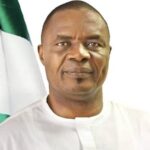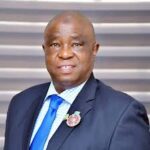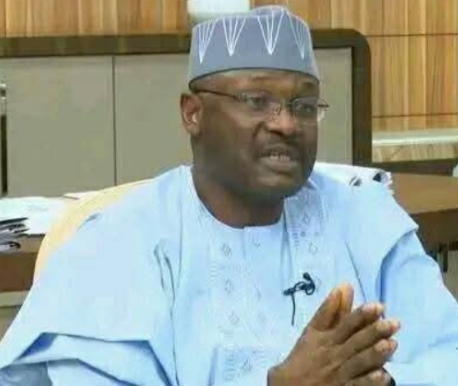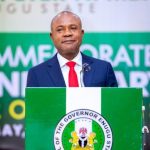The Chairman of the Independent National Electoral Commission (INEC), Prof. Mahmood Yakubu, revealed on Friday that the Commission would require approximately N126 billion to finance its activities in 2025 and to begin preparations for the 2027 general elections.
Prof. Yakubu made this statement while presenting the INEC’s 2025 budget proposal before the National Assembly Joint Committee on Electoral Matters. He noted that the N40 billion allocated to INEC in the 2025 budget, as presented by the President, would be sufficient to cover the Commission’s operations, including salaries and allowances, particularly in light of the recent increase in the national minimum wage.
Reflecting on the previous year’s allocation, Prof. Yakubu explained that INEC was also allocated N40 billion in 2024. However, this amount only covered salaries and essential social contributions, such as NHIS, pension, and ITF payments. He noted that the Commission had raised concerns about the allocation and had proposed N80 billion to better meet its financial needs. While acknowledging the efforts made by the National Assembly to secure an increase, he expressed that these efforts were not ultimately successful.
He said, “We made concerted efforts and approached the Executive for additional funds, successfully securing about N10.5 billion to facilitate the Edo and Ondo Governorship elections. This funding enabled us to conduct those elections smoothly and achieve successful outcomes.”
The INEC Chairman further emphasized that 2025 is a critical year for the Commission. He noted, “We are preparing for the Anambra Governorship election later this year, yet the budget does not account for preparations for this election. In addition, we must begin preparations for the Area Council elections scheduled for February 2026, but there is no provision for that in the current budget. We also need to monitor party primaries for these elections, along with overseeing the conduct of any bye-elections, but again, these are not covered in the current budget.”
The Chairman also emphasized the need to begin preparations for the 2027 general elections this year. He noted that while the Commission has yet to commence the Continuous Voter Registration (CVR) exercise due to financial constraints, it is imperative to initiate the process this year, with the aim of concluding it by 2026.
He highlighted the importance of addressing the redistribution of voters to polling units, particularly those that are overpopulated. He stressed that these activities require significant financial resources, which have not been accounted for in the current budget.
In addition to preparations for the general elections, Prof. Yakubu mentioned that INEC is tasked with conducting 11 bye-elections in both the National and State Houses of Assembly this year, stemming from vacancies caused by deaths and resignations. While the Commission has secured approximately N500 million from the government for these elections, he pointed out that this amount will not be sufficient to cover the full costs involved.
He argued that despite the rising costs of activities in the country, the Commission continues to receive a budget allocation of N40 billion, without accounting for the impact of the increased minimum wage. He highlighted that the Commission currently employs one of the largest workforces in the country, with over 14,700 staff, excluding political appointees.
Additionally, he pointed out that the Commission’s political appointees include the Chairman, 12 National Commissioners, and 37 Resident Electoral Commissioners, along with their aides, all of whom draw salaries and allowances from the Commission’s funds.
He also said that the Commission has over 850 building across the country in dire need of renovation as well as offices in the 8809 wards, 774 local government, 37 state offices as well as the nationa headquarters and various stores which has to be taken care of rom the budget.
He also disclosed that currently, there are still 59 local government offices located in Local Government Headquarters which it planned to relocate, adding that isthe budget of N126 billion in approved, the commission is targetting the relocation of at least 30 of them in 2025.
Reacting to the presentation by the INEC Chairman, Senator Ireti Kingible said the National Assembly must look for ways to get enough funding for the Commission if it must discharge its responibility diligently and save the nation’s democracy.
She emphasized, “INEC must remain independent, and whatever steps are necessary to secure funding for the commission must be taken. It’s not a matter of whether the commission will receive the funds, but rather that it must receive the necessary financial support.”
Adeboye Paul also weighed in, stating, “From what we’re observing, it’s evident that we are operating within a perilous system. As participants in the electoral process, we are all aware of the issues at hand. When there is a shortfall in funding, local governments often step in to make up the difference, which poses a serious threat to the integrity of the system.”
“If the essence of the budget defense is to highlight our inability to make meaningful inputs, then why do we continue with this exercise? Last year, we found ourselves in a similar situation, and despite our efforts to improve the budget, nothing changed. It is crucial that we have a thorough discussion on how best to support the commission and safeguard our democracy. Allowing them to continually depend on the Executive for funding is detrimental to the health of our democracy.”
The budget defense subsequently moved into an Executive session, with the joint committee meeting behind closed doors with the INEC Chairman, along with seven of his National Commissioners and Directors in attendance.











